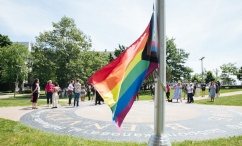When Patrick Hickey noticed a rise in rhetoric and actions that discriminated against 2SLGBTQ+ people in both Canada and the States, he wondered what kind of effect it might be having on the mental health of members of those communities.
The PhD candidate saw it come to a head in 2023 when protests were held across Canada to condemn LGBTQ-inclusive education policies in the classroom and extracurricular settings. Some provinces, like New Brunswick and Saskatchewan, were restricting the use of students' preferred first names and pronouns, prompting some to argue the policies violated children's rights and outed transgender youth.
Hickey, a student in Dal's Department of Psychology and Neuroscience, decided to look into the issue last January by interviewing representatives of organizations that serve members of the 2SLGBTQ+ community in both New Brunswick and Nova Scotia.
Hickey is continuing that work with a based on information gathered from the earlier interviews, which indicated that people in those communities were being negatively affected by anti-2SLGBTQ+ rhetoric coming out of the U.S.
Illuminating the issue
��
 "Our goal is to help better understand how discrimination is impacting the mental health of 2SLGBTQ+ communities locally and to highlight the things that people are doing to protect themselves and their well-being," he said.
"Our goal is to help better understand how discrimination is impacting the mental health of 2SLGBTQ+ communities locally and to highlight the things that people are doing to protect themselves and their well-being," he said.
"I also hope that the survey and the broader project can help shed light on how big of an issue this is and provide a platform to share the experiences and voices of 2SLGBTQ+ people in these provinces."
Hickey says the earlier interviews suggested that community members wanted spaces where they could feel safe and could spend time with other 2SLGBTQ+ people.
"We learned a lot about people feeling unsafe across many spaces and I was struck by the amount of work 2SLGBTQ+ organizations are doing to provide a feeling of safety and community to so many," he said.��
"I continue to hear from community leaders about the lasting toll anti-2SLGBTQ+ policies and rhetoric will have on mental health and feeling safe in our communities. This project aims to get a current snapshot of mental health and resiliency in our communities today."
Similarities to the U.S.
��
Since taking office, the Trump administration has rolled back policies meant to protect the rights of queer and transgender people, while also recognizing only two sexes, male and female. Hickey adds that the same rhetoric and discrimination are easy to find within Canada as well.
In its most recent data, Statistics Canada reported a 69 per cent spike in hate crimes targeting sexual orientation from 2022 to 2023.
Rabbi Nachshon Siritsky, a Nova Scotia member of the Queer Interfaith Coalition advocacy group, says the language and political shifts in the States have increased queerphobia and intolerance, raising concerns for queer people who are already at increased risk of violence and discrimination.
"I am hoping that this study will raise awareness and lead to more investment in mental health services for queer folks, more family counselling interventions and more focus on enforcing our country's hate speech laws," Rabbi Siritsky said.
"I am acutely aware of the dangers of unregulated and unscientific 'free speech' by majority voices as diminishing the safety and speech on minority voices. This is propaganda and it is dangerous."
Contribute to the research
��
The , which will be open until the end of August for up to 1,000 participants, includes questions for 2SLGBTQ+ people about access to social support from friends or family, and how experiences with discrimination have changed their lives. The researchers will also explore ways to limit those effects.
Hickey says the findings will provide insight into what people are doing to protect their mental health and will be shared with community organizations to inform support services and programs.



